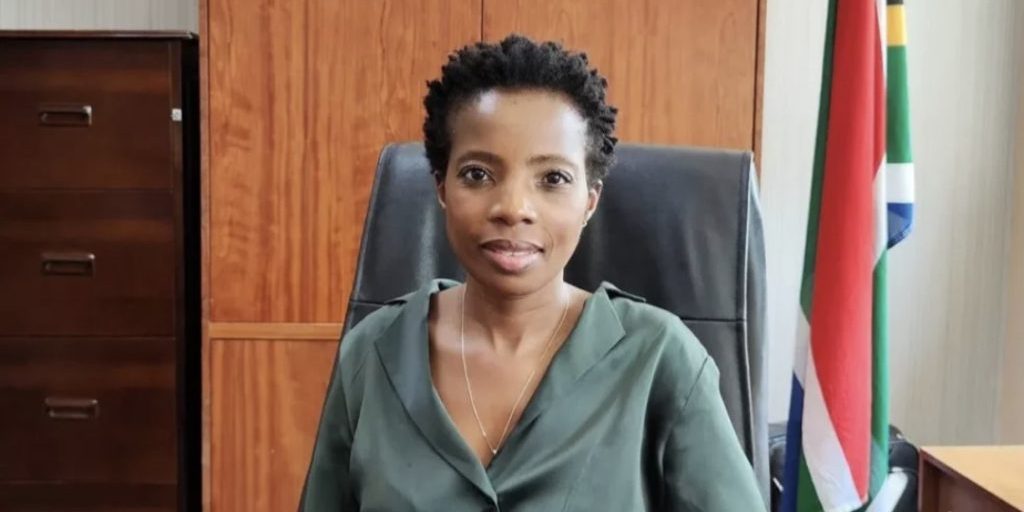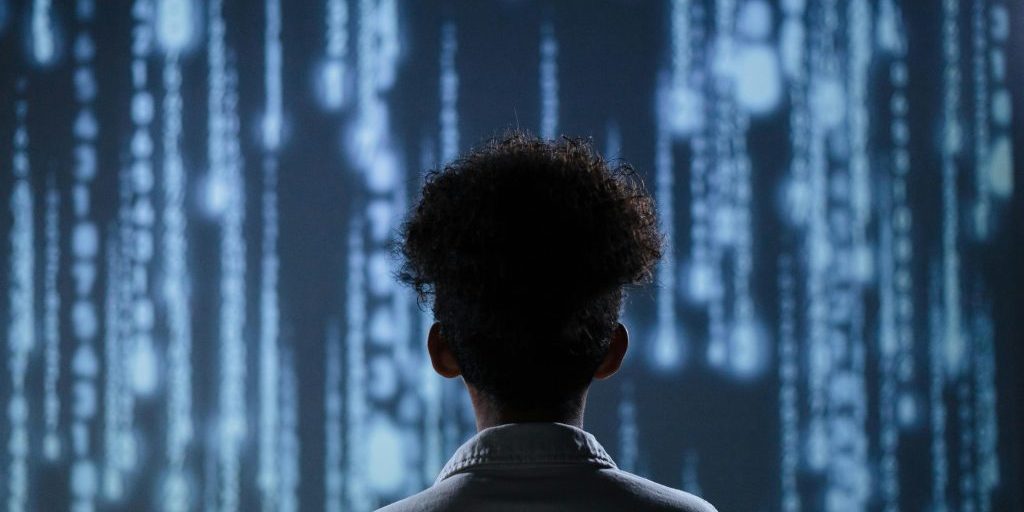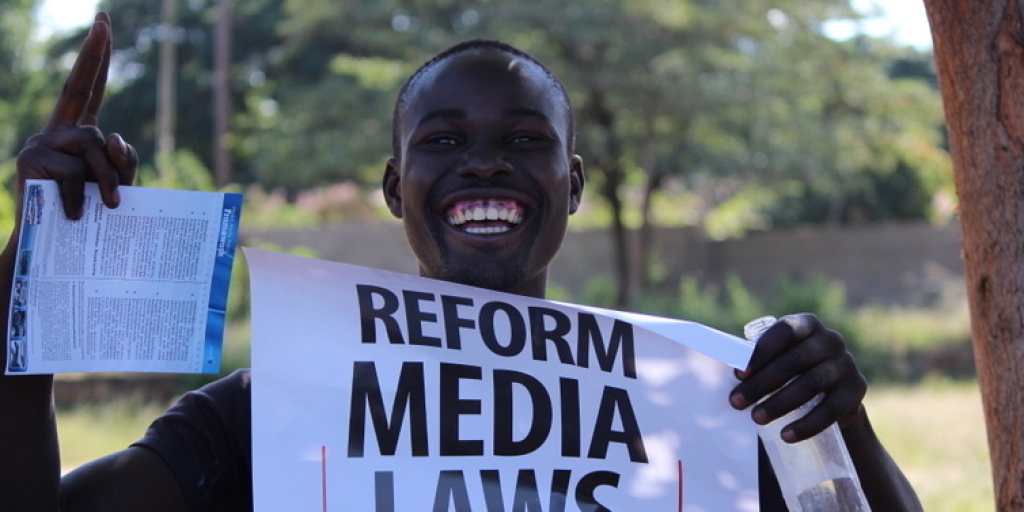Public Protector highlights ‘good work’ by the media in assisting its investigations
PICTURE: This image of Advocate Kholeka Gcaleka was used here
Address by Public Protector Advocate Kholeka Gcaleka at the SANEF Council meeting
SANEF Chairperson, Ms Nwabisa Makunga, SANEF Management Committee, invited guests, ladies and gentlemen.
The institutional transformation journey that I envisioned when I took over as Acting Public Protector and later as Public Protector, included a number of immediate priorities, such as:
• restoring public trust;
• enhancing our impartiality and independence;
• strengthening internal governance;
• promoting our professionalism and competence (making the PPSA a centre of
excellence in the field in which we operate);
• increasing transparency in our decision-making processes;
• building constructive relationships with our stakeholders (including sessions such as
this one we have with SANEF today); and
• focusing on legal and procedural reforms to enhance the institution’s ability to
function more effectively.
In addition to these, we sought to move the PPSA into contemporary times through technological innovations and enhancements (digitilisation), and dealing with the effects of he psycho-emotional stress suffered by the PPSA team emanating from the Section 194 Parliamentary Enquiry.
Public trust is a key component of democratic legitimacy. When citizens trust their government, they are more likely to support its policies and contribute to a strong democracy.
According to a survey conducted by Afrobarometer in 2021, most South African (over 60%) trust the media, particularly broadcast media. To this end, as PPSA we would like to thank the active role that you – members of the media – have, and continue to play, in strengthening our democracy.

Public Protector Advocate Kholeka Gcaleka flanked by SANEF Chairperson Nwabisa Makunga and Deputy Chair Tshamano Makhadi. SANEF Executive Director Reggy Moalusi, Council members Dr Glenda Daniels and Sbu Ngalwa, and Hopewell Radebe, are in the back row
It is also interesting to note that public trust in the Public Protector and religious leaders is higher than that of political parties and elected officials.
Chairperson, you’ll be glad to note that some of our investigations were a result of the good work that was done by the media. These cases include, amongst others:
• the construction of the Mayibuye Primary School on a wetland;
• the systemic investigation into administrative deficiencies relating to gender-based violence within the South African justice system;
• allegations of rampant corruption at Makana Local Municipality;
• protracted water shortages in Hammanskraal;
• Easten Cape systemic investigations on service delivery issues; and
• the investigation into lapses in the provision of healthcare services at the Dora Nginza
Hospital.
Indeed, some of the ongoing cases such as food contamination and the allegations of
improper conduct by the executives of the Air Traffic Navigation Services (ATNS) – which
have also been thrust into the public discourse by the media – also form part of our
investigations. We shall, of course, make these reports available to the public once the
investigations are completed. This includes the ongoing investigations into the Dora Nginza Hospital.
Allow me to thank you on how you covered the gratuity matter. Initially, there were some reports that suggested that the matter was about withholding pension funds of the previous Public Protector. But this was quickly corrected as most of your members began to understand what the litigation was all about.
The other complex report that you covered very well was an investigation into allegations of maladministration in the extended procurement of Set Top Boxes and related accessories in fulfilment of Government’s Broadcast Digital Migration project, and the alleged interference by the former Minister of Telecommunications to stop the Universal Service and Access Agency of South Africa (USAASA) to recruit and train local installers.
Ordinarily, during the appointment of a new Public Protector, it is customary to observe a transition period. This period of transition is integral to ensuring that the new incumbent can effectively uphold the values and principles of the office, promote accountability, and protect the rights of citizens in line with the Constitution.
This transition period for a new Public Protector is crucial in setting the tone for their tenure. It is during this time that we can align ourselves with the core values and principles of the office, understand our role in promoting accountability, and grasp the significance of protecting the rights of citizens as enshrined in the Constitution.
This phase allows for a smooth transition into the responsibilities of the Public Protector and ensures a solid foundation for the work ahead.
Preparing for the role of the Public Protector involves a combination of personal readiness and organisational understanding. In my case, circumstances did not however allow for a
smooth transition into the responsibilities of the Public Protector. I was fortunate (or unfortunate depending on your perspective) to have been thrown in at the proverbial deep
end’ which called for immediate effective leadership and team empowerment, resilience,
adaptability in navigating challenging organisational complexities, establishing credibility,
managing expectations, handling intricate cases, preserving independence and addressing
legal and ethical dilemmas.
We were confronted with legacy issues in the past which still impacted the Institution on various levels, particularly the aftermath of decisions affecting the financial governance of the institution.
Despite these challenges, we took the bold step to press ahead. We understood that a beyond normal effort was needed to dig ourselves out of a hole. It has been a draining effort but all worth it.
The PPSA aims to reposition itself as a centre of excellence. To achieve this vision, the
institution’s human resources must be skilled to achieve levels of performance excellence. Focusing internally, the institution aims to create a pool of specialist trainers who will be able to provide the necessary skills development for PPSA human resources.
Specialist skills development is required as PPSA operates under an expansive and unique mandate. For the 2025/2026 financial year, the focus will be on Investigation team followed by other pPthe 2025/2026 financial year, the focus will be on Investigation team followed by other Programme teams for the remainder of the Strategic Plan 2025 – 2030.
PPSA uses the collective intellectual knowledge generated through its core work. The utilisation of this knowledge is intended to improve business operations under all Programmes. The creation of an e-Resource (Electronic Resource) will enable all PPSA staff to access information at any time and from anywhere.
The PPSA e-Resource Hub will enable learning, development and application of knowledge. Importantly, the e-Resource will be the intellectual hub of PPSA where knowledge is used and created.
Repositioning the Institution to be more impactful will require adequate human, financial and technological resources. The PPSA will work with the National Treasury in determining an ideal budget for the Institution to fulfil its constitutional and expansive legislative mandate.
The repositioning of the Institution as a centre of excellence will result in the following
outcomes:
• Improved institutional effectiveness and efficiency,
• Protection of the public against conduct failure and maladministration,
• Enhanced accessibility of PPSA services by all stakeholders, and
• Improved culture of good governance in public service.
Strengthening the PPSA’s corporate governance for the next five years will include
streamlining governance structures, strengthening internal controls, monitoring adherence with policies and fostering an ethical culture. Through regular governance reviews and continuous improvement initiatives, PPSA will be a leading institution to be emulated by other institutions.
Through an enormous collective effort between leadership and staff, we are beginning to turn the tide on the battered reputation of the Institution described above. The leadership,
supported by the significant collective efforts of PPSA staff, is focused on guiding the
institution onto a path that seeks to enhance its reputation and operational effectiveness.
Our journey underscores the importance of leading with a strong ethical compass, fostering a resilient and empowered team, and maintaining an unwavering commitment to organisational values and public trust.
As an institution, since my official appointment as the fifth Public Protector of the Republic of South Africa, we have recorded significant milestones which are motivating to our team. These milestones include:
Improved implementation of our remedial action
When we started on our collective institutional journey of the tenure of the fifth Public Protector, the enforcement and implementation of the remedial action was marred by challenges to hold state actors to account in the face of adversities such as increased litigation against the PPSA and low level of compliance with remedial action.
Since November last year, we have noted an encouraging uptrend in the implementation of our remedial action. This is such a welcome considering the impact this would have in our efforts to entrench good governance as a basis for improving public service and subsequently service delivery to the people.
I must indicate that without implementation of our remedial action we cannot give meaning to the existence of this institution as it means our investigations become a road to nowhere.
The Constitutional Court reminded us in the Economic Freedom Fighters v Speaker of the National Assembly and Others that our remedial action, besides being binding, is ‘not inflexible in its application, but situational’ [at paragraph 71].
We have adopted a strategy to have regular interactions with the complainants and those we are likely to find against about the status of our investigations. This is to ensure that the remedial action we take at the end of the investigation is something both parties have worked on.
This has led to less resistance towards our remedial action. The latest statistics show
that implementation of our remedial action has jumped to 29% from 2% two years ago.
This is an encouraging upward trend and remain committed through our various stakeholder engagement programmes to increase it to at least 50% in the next two to three years.
Also worth noting is that due to the improved quality of our reports through strict application of the law, we have seen a drastic reduction in our reports being taken on judicial reviews.
This year (2024/25 financial year) for example, we have only one case that has been
taken on review, and that is by the retired former Director-General in the Office of the Premier in the Free State.
In the 2023/24 financial year there were four judicial reviews; three in 22/23; 10 in 2021/22; five in 2020/21 and a whopping 24 in 2019/20.
Building capacity and expertise
Considering the work we do, the PPSA team need to be on top of its game. It is against this
ideal that we went on an aggressive training and capacitation programme to align our team members with the peers elsewhere.
I must indicate that the efforts are bearing results. We enlisted the services of experienced trainers and subject experts on for instance the area of Public Procurement.
We have furthermore stepped up on our endeavours and opportunities to engage with the
public and stakeholders to understand their concerns and perspectives. Building
relationships and trust with the community is key to fulfilling our mandate effectively.
We entered into Memoranda of Understanding (MOU) with several professional bodies to
collaborate on issues of mutual interests and advantages of our respective organisations, secure training and skills transfer for our team. One such is an MOU we signed with the
Association of Certified Fraud Examiners (ACFE) in terms of which we have committed to
work together to capacitate our team in the areas of fraud and corruption.
At continental and global level, the PPSA team continue to be exposed to training programmes offered by various international speakers. As a member of the International Ombudsman Institute (IOI), the team has attended several training courses organised by member states and endorsed by IOI. This has assisted with the much-needed transfer of skills to further capacitate our team.
Impactful investigations
Our investigations continue to make an impact in communities across the countries. It
remains our commitment that our investigations become a foundation for the policy formulation in addressing some of the challenges the public service and the country at large faces.
Since assuming the position of the Public Protector, we have issued several investigation reports addressing various mandate areas of the Institution. Among those is an investigation into systemic deficiencies within the criminal justice system.
We are encouraged by the tone with which the report was received and accepted by both the government and civil society. We are continuously monitoring the implementation of the prescribed remedial action.
At the same time, our investigation into issues plaguing maintenance in our courts is at an
advanced stage. It is our hope that through this investigation we should be able to resolve challenges faced by those applying or having to receive child maintenance.
Improved caseload management
- Over 10 000 cases received in 2023/24, double the load from a year before
- Over 6 000 of these cases resolved
- 90% of the cases finalised within turnaround time compared to 82% before
Over the next five years, we will be working towards ensuring equitable delivery of services
to the people of South Africa. Our complaints statistics for 2023/24 showed that 84% were
service delivery related, demonstrating the need for intervention within the local government terrain.
A recent study undertaken by Good Governance Africa found that levels of satisfaction with municipal governance were low, with an average of 30% in 2021 compared to previous years (2019 – 2020) which was 45%.
Digitalisation and enhanced access
The digitalisation process is on-going. Apart from fully rolling out our electronic Case
Management System (CMS), we are also integrating our entire processes into digital. This is to, among others, ensure that our processes are efficient and effective to help us deliver on our constitutional mandate.
We are already seeing improvements on a case load management due to this system.
In addition, we will soon be launching a call-back system. Through this programme, a member of the public who wishes to register a complaint with us and is unable to call, can just drop us a call-back and our team will call them back. This is to ensure that we enhance access of our services to all persons and communities as directed by the Constitution
On in-person/physical access, we have galvanised our efforts to reach as many people as
we can through expanded reach. We have opened regional offices in areas such as Benoni
to bring our services closer to the communities. Additional ones will be opened in areas such as Kwa-Mhlanga in Mpumalanga and other areas.
The above efforts to highlight the work of the PPSA and avail its services is further amplified by you, the media. We continue to partner with yourselves and community media to bring our communities up to date about the work we do as the PPSA.
We continue to be grateful for your support — without which achieving our constitutional directive of being ‘accessible to all persons and communities’ would not be possible.
Criminal Assets Recovery Account (CARA) funds
A significant achievement for the PPSA was obtaining access to the CARA funds for the first time. The Cabinet has approved an allocation of R48-million to the PPSA, acknowledging its role in combating corruption.
This funding will substantially enhance the institution’s investigative capacity and resources, enabling it to effectively fulfil its mandate as a key component of the country’s ‘anti-corruption arsenal’ as outlined in the National Development Plan 2030.
The CARA funding is intended for, amongst others, the prioritisation of impactful special investigation projects and historically unfunded priorities resulting from expansion of anti-corruption mandate of the Public Protector. However, this windfall does not resolve all the funding challenges that the PPSA faces.
Since the funding is accounted for, maintained and controlled separately from the PPSA baseline expenditure and budget, it does not alleviate the funding and fiscal pressures on the PPSA to perform its Constitutional mandate and function effectively and serve and provide access to marginalised and vulnerable communities.
Amendments to the Public Protector Act
Ladies and gentlemen, the PPSA initially submitted its proposed amendments of the Public Protector Act (PP Act) to the Department of Justice and Constitutional Development (DoJ&CD) in June 2023, but through collaborative benchmarking and engagement, identified further areas for review to make the Public Protector Act one of the most progressive legal frameworks for institutions of this nature.
To this end, we recently submitted additional proposals to the DoJ&CD.
The reforms which the PPSA seek are:
- to align the Public Protector Act to the Constitution;
- strengthen whistleblower protection;
- address the deficiency between the Public Protector Act and the PFMA on the role and responsibilities of the CEO as Accounting Officer in relation to the functions and powers of the Public Protector and further,
- to align other subsequent national legislation which impact the Public Protector Act
The amendments seek to provide, amongst others, for additional powers to deal with protected disclosures by enhancing the Public Protector’s legal capacity to effectively deal with protected disclosures reported to him or her in terms of section 8(a) of the Protected Disclosures Act No 26 of 2000, including measures to protect whistleblowers from retaliation or occupational detriment by public institutions
The proposed amendments further aim to enhance the role of Parliament in the
establishment of oversight mechanisms to deal with the Public Protector’s reports to the
National Assembly or a Provincial Legislature on the findings of a particular investigation in terms of section 8(2) (b) of the Act.
To enhance the enforcement of the binding nature of the Public Protector’s remedial action, amendments are furthermore proposed to expand the categories of conduct that would constitute contempt of the Public Protector, to include the intentional failure or refusal, absent a judicial review application, as well as an appropriate interdict, to comply with or implement the Public Protector’s remedial action issued in terms of section 182(1 (c) of the Constitution.
We are also exploring the options for imposing administrative penalties for a further
alternative enforcement mechanism to deal with, amongst others, the unlawful disregard of the Public Protector’s binding remedial action and other lawful binding directives.
Team empowerment and collegiality
A Public Protector can hardly work alone or in isolation. It is therefore imperative that the
people who assist and support me feel empowered by creating an environment where they
feel valued and heard. Personally, I encourage open communication and active participation in decision-making.
Without collegiality among the staff members and between staff and the leadership members, the institution will be unable to work effectively. The Public Protector may have full authority within the law, but within the institution, others share the responsibility for its work.
The Public Protector cannot do everything alone but needs to work as head of a team if the institution is to succeed. Teamwork is therefore the essential way of working. This requires high levels of trust, common vision and mutual accountability among the leadership and management.
These requirements do not occur naturally but have to be consciously built and fostered. The common vision is developed through the strategic planning process. That process leads to an agreed plan for the organisation as a whole to which all leaders and all staff can be committed through their involvement in the process itself.
The planning process can also build trust and its product, the strategic plan, can be the mechanism for mutual accountability.
Other senior staff within the PPSA also share in the leadership role. They are the directors or heads of staff units who are responsible for the work of those units, the supervision of the staff in the units and the control of the units’ budgets.
International links
The expansion of our brand beyond our borders received a significant boost over the past 12 months. I was earlier in the year appointed as a President of the IOI Africa Region. This was added to my existing role as a Chairperson of the African Ombudsman Research Centre (AORC) Board.
Through this, we continue to build solid networks around the world as part of our stakeholder engagement while also promoting the work of our institution.
We have participated at various international conferences in countries such as Netherlands, Botswana, England, and Estonia. We recently also hosted the Ombuds of Mozambique together with the Zimbabwe Human Rights Commission.
We will continue to engage with our counterparts from across the world to exchange best practices.
Let me conclude by thanking the tenacity displayed by the PPSA staff after a very emotionally taxing period following the section 194 Parliamentary Enquiry. Without them, together with the management team, the vision that we share with you here today will not be possible.
Once again, thank you members of the media for continuing to expose malfeasance, and doing your best to safeguard the country for the future of our children. Without your
investigations, much of the corruption cases that are in the courts today or pending would not have been exposed. I say keep up the good work
I would also like to thank our partners such as:
• the European Union;
• the IOI;
• the Gesellschaft für Internationale Zusammenarbei (GIZ);
• the Association of Certified Fraud Examiners (ACFE);
• the Ethics Institute of South Africa;
• Public Interest South Africa;
• Ombudsman of various municipalities;
• Speakers of provincial legislatures; and
• the Turquoise Harmony Institute – which has graciously committed to help us get our library (e-Resource) off the ground.
Thank you.
- Read the original speech here




